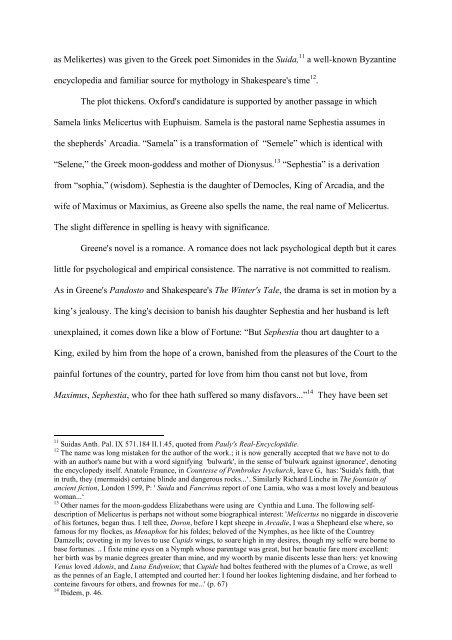Detobel's Collected Essays - Elizabethan Authors
Detobel's Collected Essays - Elizabethan Authors
Detobel's Collected Essays - Elizabethan Authors
You also want an ePaper? Increase the reach of your titles
YUMPU automatically turns print PDFs into web optimized ePapers that Google loves.
as Melikertes) was given to the Greek poet Simonides in the Suida, 11 a well-known Byzantineencyclopedia and familiar source for mythology in Shakespeare's time 12 .The plot thickens. Oxford's candidature is supported by another passage in whichSamela links Melicertus with Euphuism. Samela is the pastoral name Sephestia assumes inthe shepherds’ Arcadia. “Samela” is a transformation of “Semele” which is identical with“Selene,” the Greek moon-goddess and mother of Dionysus. 13 “Sephestia” is a derivationfrom “sophia,” (wisdom). Sephestia is the daughter of Democles, King of Arcadia, and thewife of Maximus or Maximius, as Greene also spells the name, the real name of Melicertus.The slight difference in spelling is heavy with significance.Greene's novel is a romance. A romance does not lack psychological depth but it careslittle for psychological and empirical consistence. The narrative is not committed to realism.As in Greene's Pandosto and Shakespeare's The Winter's Tale, the drama is set in motion by aking’s jealousy. The king's decision to banish his daughter Sephestia and her husband is leftunexplained, it comes down like a blow of Fortune: “But Sephestia thou art daughter to aKing, exiled by him from the hope of a crown, banished from the pleasures of the Court to thepainful fortunes of the country, parted for love from him thou canst not but love, fromMaximus, Sephestia, who for thee hath suffered so many disfavors...” 14 They have been set11 Suidas Anth. Pal. IX 571.184 II.1.45, quoted from Pauly's Real-Encyclopädie.12 The name was long mistaken for the author of the work.; it is now generally accepted that we have not to dowith an author's name but with a word signifying 'bulwark', in the sense of 'bulwark against ignorance', denotingthe encyclopedy itself. Anatole Fraunce, in Countesse of Pembrokes Ivychurch, leave G, has: 'Suida's faith, thatin truth, they (mermaids) certaine blinde and dangerous rocks...‘. Similarly Richard Linche in The fountain ofancient fiction, London 1599, P: ' Suida and Fancrinus report of one Lamia, who was a most lovely and beautouswoman...‘13 Other names for the moon-goddess <strong>Elizabethan</strong>s were using are Cynthia and Luna. The following selfdescriptionof Melicertus is perhaps not without some biographical interest: 'Melicertus no niggarde in discoverieof his fortunes, began thus. I tell thee, Doron, before I kept sheepe in Arcadie, I was a Shepheard else where, sofamous for my flockes, as Menaphon for his foldes; beloved of the Nymphes, as hee likte of the CountreyDamzells; coveting in my loves to use Cupids wings, to soare high in my desires, though my selfe were borne tobase fortunes. .. I fixte mine eyes on a Nymph whose parentage was great, but her beautie fare more excellent:her birth was by manie degrees greater than mine, and my woorth by manie discents lesse than hers: yet knowingVenus loved Adonis, and Luna Endymion; that Cupide had boltes feathered with the plumes of a Crowe, as wellas the pennes of an Eagle, I attempted and courted her: I found her lookes lightening disdaine, and her forhead toconteine favours for others, and frownes for me...' (p. 67)14 Ibidem, p. 46.


